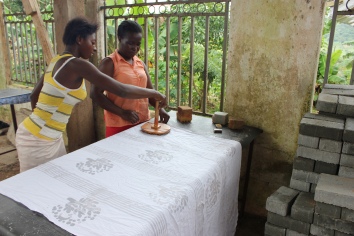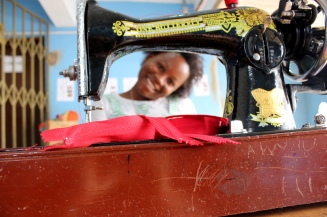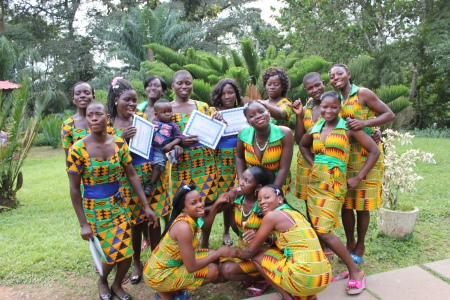ABAN: Empowering Girls in Ghana, One Fabric at a Time!
ABAN: Empowering Girls in Ghana, One Fabric at a Time
ABAN co-founder Callie Brauel, bottom right, gathers with a group of young Ghanaians benefiting from their own work through ABAN. At top left is Emmanuel Quarmyne, ABAN’s Ghana Programs Director, beside UNC graduate Carly Brantmeyer.
So, I thought I would start this week off on a bit of a lighter note than the one I left you with on Friday (sorry girlfriends, but I have to keep it real, you know?). Before turning to the final installment of my interview with Eco Fashion pioneer Marci Zaroff, I wanted to highlight a truly inspiring non-profit called ABAN (A Ban Against Neglect), co-founded by Callie Brauel and Rebecca Brandt while studying at the University of Ghana in the capital city of Accra in 2008. Upon arriving for their semester abroad, the two students were confronted by the huge problem of environmental waste left behind by the plastic bags of pure water sold to Ghanians, in the amount of forty tons a day. As their semester progressed, they eventually discovered another haunting problem: the 30,000 street girls from rural areas of the country who had left their families in the hope of finding work in the capital, only to be left homeless in the streets. Although they volunteered at a local agency that helped some of these girls, it was only when they developed a mock nonprofit company for recycled products for a class, that the idea for ABAN began to form. Why not give these girls much needed job skills and economic independence by having them take the plastic waste from the water bags and ‘upcycle’ them into cute bags and purses? Teaming up with Ghanian University student Emmanuel Quarmyne, who is currently ABAN’s Ghana Director, the three students were able to get a few sewing machines donated by non-profits, and partnered with Street Girls Aid, a Ghanian NGO that aids a small group of mothers and girls that are living off of the street. In 2010, after winning the Carolina Challenge, the team launched their own job skills and vocational training non-profit with ten young mothers aged 15-20 coming off the streets of Accra. Now, two years later, ABAN has not only graduated their first class of girls, but recycles over ten thousand plastic bags a month!
OK, stop. Building cross-cultural coalitions to empower young girls? Through the craft of sewing? And upcycling waste while doing it? ‘Listen Girlfriends’ DIES.
I was thrilled to have the opportunity to chat with Callie Brauel, who currently resides in Chapel Hill, the other day over coffee, and she shared with me some of the challenges ABAN initially faced, how the organization works, and how they plan to move forward.
Nadia: So ABAN’s mission seems to be really holistic. In addition to the health care, living wages, daycare, and job employment the girls receive, there is also a staff of ten people, including a house mother and psychologist on board. Was it always this way?
Callie: No, it wasn’t. When ABAN first started, we hired a seamstress and we thought it was enough to provide our class of ten girls with a job from nine to five every day. It became very clear however, that these girls had gone through so much trauma, and that unlike many Ghanians, who have a strong social and familial network, they really lacked that support. They had, in some way or another, been neglected. And that obviously leaves scars, and it was clear that they needed emotional support as well, especially since most of them, even though they were all under the age of 20, had children. Once we realized this, we knew that we had to expand our organization’s mission and team.
So in May of 2011, Rebecca and I came back to the United States, and we went on a house tour through different parts of the U.S., and we raised $30,000 in two weeks. And with that money, we decided to get the girls out of Accra, and rent our own facility in Aburi, which is just east of the capital.
Nadia: So how does the program work now? What is a day like at ABAN?
Fun while sewing.
Callie: Well, in the morning the girls work on their products, and in the afternoon, they take Math, English, Business Education, Leadership and Empowerment courses. We really try to empower the girls as much as possible, so they take turns cooking as well. Keep in mind that most of the girls come into our program without having had much or any formal education, so vocational training is key to their success. Often the skills they learn at ABAN will prove useful in future careers or side businesses. Since the girls are paid for their work they also get the added benefits of learning to hold a job and budget their money before they graduate from ABAN, all of which are necessary skills to provide for themselves and their children.
Nadia: You describe ABAN as a ‘fabric of change.’ So how do the girls make their products?
 Two students practice the art of batik dying.
Two students practice the art of batik dying.
Callie: What is awesome about the ABAN products is that each one is a piece of art. There is so much involvement in every step of the process, making each handmade product unique to the girl who made it. The first step involves the collection of bags. We network with local schools in the area to collect bags and promote environmental education in doing so. After collection, the bags are hand washed, sanitized and laid in the sun to dry.
We’re also working on producing a batik fabric, which is a multi-toned fabric. To make this, the girls take a piece of white fabric, and then use a wooden stamp to dip it into wax. You dye it in the first color, which is a lighter color, and then repeat the process with a darker color. That gives you the three-toned look of the fabric. And then water is used to remove the wax. And the dye we receive differs so much in color, because it is dependent on the weather and climate. So a red we get one day might be completely different from the red we receive the next. Which makes the process all the more exciting and a true learning process! Currently, the girls are learning how to make the batik fabrics, and we’re also supporting local artisans to meet our demand. The products are finished with a final detail- a key chain made from recycled glass! We had college students come over this summer and work with a local artisan to make us a bead center on site.
Nadia: So where do you sell your products
 Desmund, Denicia’s son, sits with an ABAN travel case. One case recycles 24 plastic sachets, and provides life and job-skills training for a month for an ABAN girl.
Desmund, Denicia’s son, sits with an ABAN travel case. One case recycles 24 plastic sachets, and provides life and job-skills training for a month for an ABAN girl.
Callie: We have an online store, and the list of retailers who sell our products are listed on there as well. Currently, 40% of our revenues come from sales, and 60% from grants and donations. We really like the idea of becoming self-sufficient through sales and having 80-90% of our revenue coming from sales, eventually.
Nadia: Are you looking to expand in the future?
Callie: Yes! We recently bought six acres of land, and in the next one to two years we will expand our program to thirty girls. Our hope is that within the next five years, we can start an actual ABAN campus for seventy to eighty girls! We are also have a sister organization called ACE (ABAN Community Employment) with ten seamstresses employed at fair wages and with key benefits who further support our organization as demand grows it the US. This extra revenue will help us expand our mission on the ground to support more girls in the ABAN school.
Nadia: So I have to ask, why is ABAN so invested in girls?
Callie: Well, for two reasons. Living in Accra, you see how vulnerable the girls are, because they are the ones who are forced to migrate to the capital to find work for their families. Secondly, there is a mounting amount of research supporting what is being labeled as The Girl Effect, that investing in a girl’s education doesn’t just change that girl’s life, it changes her family’s life as well, and betters the community. And we are definitely seeing that with the young women who have children. When their lives are improved, economically and emotionally, they can provide a better life for their children.
First graduation!
Nadia: Do you have any success stories you would like to share?
Callie: Well, there is Asimaw, who loves to sew and is currently working as an apprentice. She is dreaming of starting her own business and employing and educating many other women like herself. Oh and I have to tell you about Denicia! She’s another girl who graduated from her program and received a scholarship at a private boarding school just outside the capital in Ghana. We have recycling initiatives with several schools that send us their plastic waste, and for several months we tried to get a recycling initiative started at her school, but it never transpired. Well one day, she saw all of these bags and bags of plastic piled outside of the school that were going to be dumped in a landfill. When they started to burn all of these bags, releasing all of these chemicals into the air, Denicia sprinted across the field and put a stop to it. And now the whole school has a recycling initiative, and they send all of their plastic bags to us. She is determined to be a top military officer in Ghana and with her determination, I know she is bound to get there.
Nadia: So how can people get involved and help?
Callie: There are so many ways! We have some great educational resources for teachers who want to introduce the culture of Ghana to their students, such as the craft of bead making, music, and dance. We also have a ‘Life Change’ kit where we send students a recycled water sachet, a piece of hemp, and beads to decorate with. It is a wonderful way to empower students with the idea that they indeed, can make a change.
You can also check out our website and donate online. We have a detailed explanation of where the money goes and how it changes a girl’s life. Or you can throw an ABAN party to raise awareness with your peers. We have all of the resources online to make it really easy!
Also, we are offering a 30% discount on online sales for reading this article! Enter girleffect2012 at checkout, valid until December 31! Thanks for your support!
Looking for other ways to connect with ABAN? Check them out on Facebook, Twitter and Pinterest.
Want to share a short video on what ABAN is all about? Click here.
Interested in selling ABAN products at a retail location? Click here for a promotional video of all of their products!
Here’s a ten-minute documentary on the girls of ABAN:
Welcome to
Ethical Fashion SOURCE Network
© 2025 Created by Ethical Fashion Forum.
Powered by
![]()


You need to be a member of Ethical Fashion SOURCE Network to add comments!
Join Ethical Fashion SOURCE Network